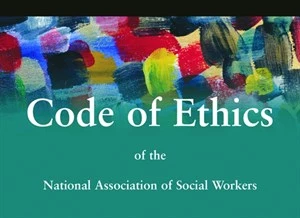 Not a fill-in-the-blank, not a multiple choice, just an excerpt, 'cause you need to know this. Section 1.03 of the Code of Ethics: Informed Consent.
Not a fill-in-the-blank, not a multiple choice, just an excerpt, 'cause you need to know this. Section 1.03 of the Code of Ethics: Informed Consent.
(a) Social workers should provide services to clients only in the context of a professional relationship based, when appropriate, on valid informed consent. Social workers should use clear and understandable language to inform clients of the purpose of the services, risks related to the services, limits to services because of the requirements of a third party payer, relevant costs, reasonable alternatives, clients' right to refuse or withdraw consent, and the time frame covered by the consent. Social workers should provide clients with an opportunity to ask questions.
(b) In instances when clients are not literate or have difficulty understanding the primary language used in the practice setting, social workers should take steps to ensure clients' comprehension. This may include providing clients with a detailed verbal explanation or arranging for a qualified interpreter or translator whenever possible.
(c) In instances when clients lack the capacity to provide informed consent, social workers should protect clients' interests by seeking permission from an appropriate third party, informing clients consistent with the clients' level of understanding. In such instances social workers should seek to ensure that the third party acts in a manner consistent with clients' wishes and interests. Social workers should take reasonable steps to enhance such clients' ability to give informed consent.
(d) In instances when clients are receiving services involuntarily, social workers should provide information about the nature and extent of services and about the extent of clients' right to refuse service.
(e) Social workers who provide services via electronic media (such as computer, telephone, radio, and television) should inform recipients of the limitations and risks associated with such services.
(f) Social workers should obtain clients' informed consent before audiotaping or videotaping clients or permitting observation of services to clients by a third party.

 Not a fill-in-the-blank, not a multiple choice, just an excerpt, 'cause you need to know this. Section 1.03 of the
Not a fill-in-the-blank, not a multiple choice, just an excerpt, 'cause you need to know this. Section 1.03 of the